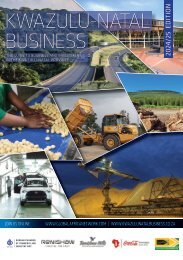South African Business 2018 edition
Welcome to the sixth edition of the South African Business journal. First published in 2011, the publication has established itself as the premier business and investment guide to South Africa, supported by an e-book edition at www.southafricanbusiness.co.za. Regular pages cover all the main economic sectors of the South African economy and give a snapshot of each of the country’s provincial economies. Feature articles on topical issues such as sustainability and African trade provide unique insights, together with an interview with the newly elected chairman of the African Association of Automotive Manufacturers, Mr Thomas Schaefer. Another special feature focusses on an exciting project to transform South Africa’s small harbours and coastal properties. South African Business is complemented by nine regional publications covering the business and investment environment in each of South Africa’s provinces. The e-book editions can be viewed online at www.globalafricanetwork.com. First published in 2011, the publication has established itself as the premier business and investment guide to South Africa, supported by an e-book edition at www.southafricanbusiness.co.za Regular pages cover all the main economic sectors of the South African economy and give a snapshot of each of the country’s provincial economies. Feature articles on topical issues such as sustainability and African trade provide unique insights, together with an interview with the newly elected chairman of the African Association of Automotive Manufacturers, Mr Thomas Schaefer. Another special feature focusses on an exciting project to transform South Africa’s small harbours and coastal properties. South African Business is complemented by nine regional publications covering the business and investment environment in each of South Africa’s provinces. Visit www.globalafricanetwork.com for more business and investment news, opportunities and events.
Welcome to the sixth edition of the South African Business journal. First published in 2011, the publication has established itself as the premier business and investment guide to South Africa, supported by an e-book edition at www.southafricanbusiness.co.za.
Regular pages cover all the main economic sectors of the South African economy and give a snapshot of each of the country’s provincial economies. Feature articles on topical issues such as sustainability and African trade provide unique insights, together with an interview with the newly elected chairman of the African Association of Automotive Manufacturers, Mr Thomas Schaefer. Another special feature focusses on an exciting project to transform South Africa’s small harbours and coastal properties.
South African Business is complemented by nine regional publications covering the business and investment environment in each of South Africa’s provinces. The e-book editions can be viewed online at www.globalafricanetwork.com.
First published in 2011, the publication has established itself as the premier business and investment guide to South Africa, supported by an e-book edition at www.southafricanbusiness.co.za
Regular pages cover all the main economic sectors of the South African economy and give a snapshot of each of the country’s provincial economies. Feature articles on topical issues such as sustainability and African trade provide unique insights, together with an interview with the newly elected chairman of the African Association of Automotive Manufacturers, Mr Thomas Schaefer. Another special feature focusses on an exciting project to transform South Africa’s small harbours and coastal properties.
South African Business is complemented by nine regional publications covering the business and investment environment in each of South Africa’s provinces. Visit www.globalafricanetwork.com for more business and investment news, opportunities and events.
Create successful ePaper yourself
Turn your PDF publications into a flip-book with our unique Google optimized e-Paper software.
Skills development<br />
Job-relevant training is key to economic growth.<br />
Twenty-two <strong>South</strong> <strong>African</strong>s headed to<br />
Abu Dhabi in October 2017 for the<br />
WorldSkills International competition. The<br />
<strong>South</strong> <strong>African</strong>s were selected from 20 skills<br />
areas which forms part of the WorldSkills <strong>South</strong><br />
Africa project and The Decade of the Artisan campaign,<br />
both supported by the National Department<br />
of Higher Education and Training (DHET).<br />
Participation in the WorldSkills International<br />
(WSI) competition showcases talented young<br />
<strong>South</strong> <strong>African</strong>s, but also highlights the need to<br />
get young people enthused by the idea of becoming<br />
artisans and technicians. The National<br />
Development Plan (NDP) envisages <strong>South</strong> Africa<br />
producing 30 000 artisans per year by the year<br />
2030. The current figure is about 13 000 per year.<br />
WSI participants from <strong>South</strong> Africa included<br />
skilled young people in the fields of water technology,<br />
mechatronics, IT networks, graphic design,<br />
plumbing and heating, welding, bricklaying, cooking,<br />
refrigeration, spray painting, hairdressing and<br />
mobile robotics.<br />
<strong>South</strong> Africa has one engineer to every 3 166<br />
citizens, compared to Malaysia where the figure is<br />
543 citizens per engineer. The Skills Development<br />
Amendment Act is intended to improve the situation,<br />
and not only in engineering. Several institutions<br />
have been created to help guide policy<br />
in skills and training, and to guide the actions of<br />
training institutions.<br />
Sector Education and Training Authorities (SETAs)<br />
collect dues from companies in a particular industry<br />
(Wholesale and Retail, Banking, Construction,<br />
Chemical Industries, for example) to promote training<br />
in that industry. A percentage of this money is<br />
returned to the company if that company can show<br />
that they have a workplace training plan. The rest of<br />
the money is used by the SETA to offer skills training.<br />
In the Eastern Cape the Manufacturing,<br />
Engineering and Related Services Authority<br />
SOUTH AFRICAN BUSINESS <strong>2018</strong><br />
34


















